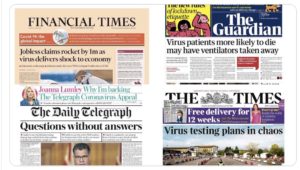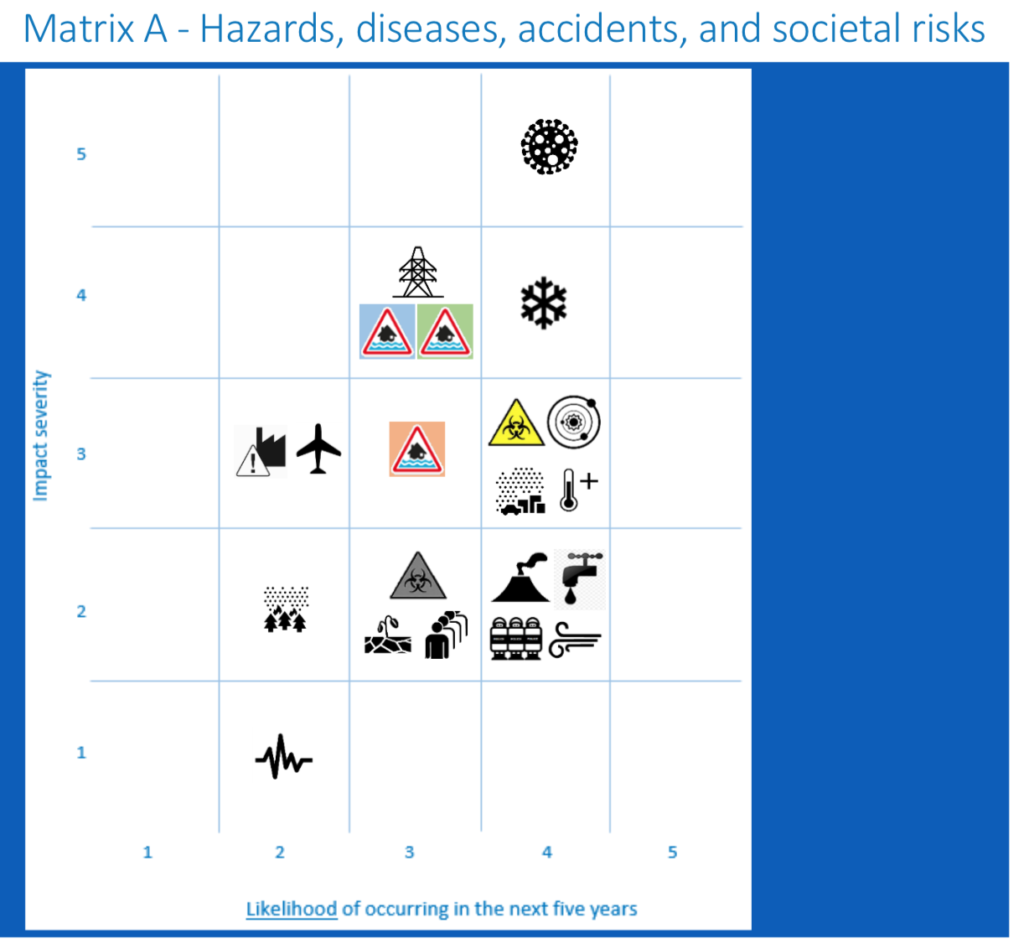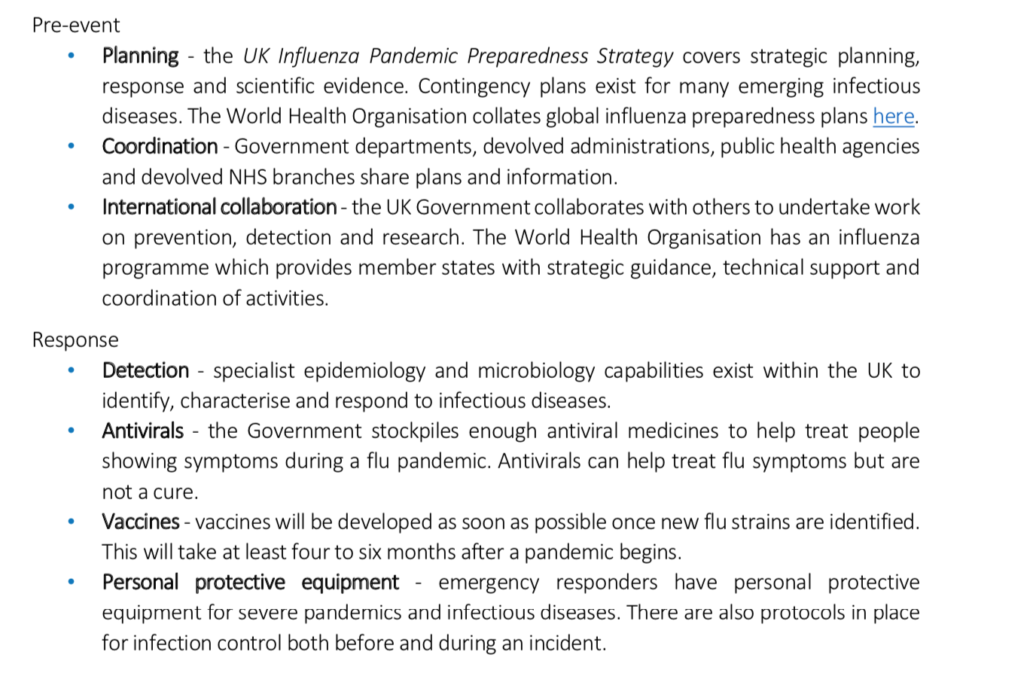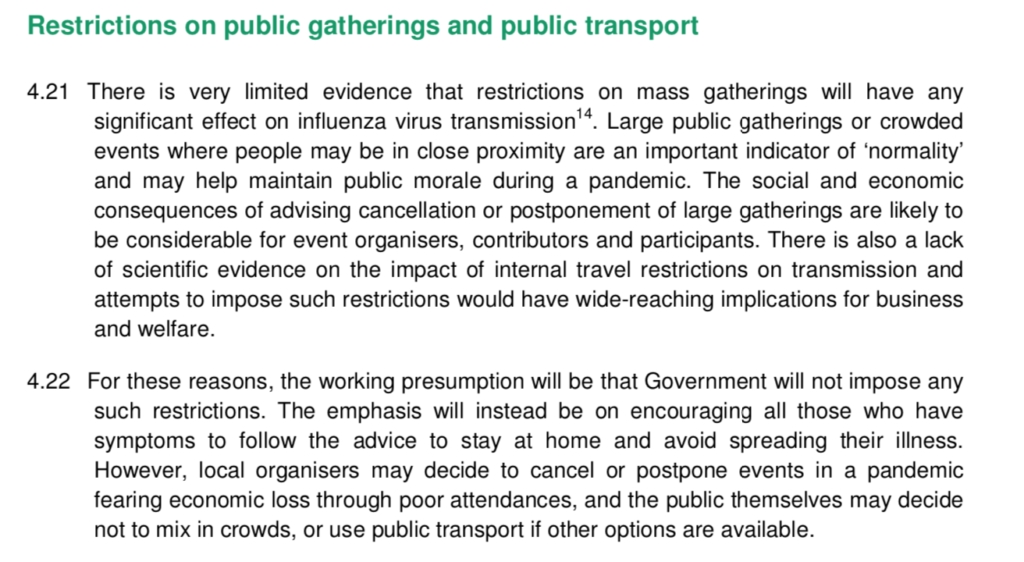This blog is now also available as a once-a-day email. If you think this might work better for you why not subscribe here? (It’s free and there’s a 1-click unsubscribe if you subsequently decide you need to prune your inbox!) One email a day, in your inbox at 07:00 every morning.
The end of Boris Johnson’s media honeymoon: today’s front pages
The ‘serious’ papers are bad enough (though whether the Telegraph deserves that description is questionable, given that it has hitherto just been a Johnson fanzine).
But just look at the tabloids.
Interesting ne c’est pas?
Images from Peter Foster – @pmdfoster
Roots of the UK’s Covid-19 fiasco
I’ve been reading the most recent (2017) edition of the UK’s National Risk Register to try and understand why we’ve wound up as possibly the worst-prepared major country (outside of the US) for the calamity that is upon us.
The first thing to note is that the government classified this kind of pandemic as the most serious potential risk to the country. It was designated a Level 5 risk in the “Hazards,diseases, accidents and societal risks” category. Just for comparison, on the “Malicious attacks” register, terrorist attacks were only ranked as Level 3. Here’s the relevant chart from the document:
And here’s the summary of “What’s being done about the risk?”
Note the text in the paragraphs on Planning, Coordination, International Collaboration, Detection and Personal Protective Equipment and ask yourself if you know of any evidence that anyone in government had read any of them in the three years since this document was last updated.
Having done so, can I suggest that you then turn to “Why Weren’t We Ready?” a splendid piece of reporting by Harry Lambert in the current issue of the New Statesman? Here’s a relevant excerpt:
That it is a novel virus and the government’s plans were for influenza is “immaterial”, says David Alexander, professor of disaster risk reduction at University College London. The coronavirus closely resembles the threat anticipated in government planning documents, of a highly infectious respiratory disease that critically hospitalises between one and four per cent of those it infects. And yet the government appears to have been unprepared. The UK lacks ventilators, personal protective equipment and testing kits, while emergency procedures for manufacturers and hospitals are being improvised on the fly.
But the government’s planning documents – which date from 2005 to 2018 but are mainly based on the 2011 “Influenza Preparedness Strategy” – suggest that Britain may in fact have been prepared, just for the wrong outcome. The UK’s plans appear to have rested on a false assumption: if a pandemic such as Covid-19 struck, the UK intended only to mitigate rather than suppress the impact.
Mitigation accepts that the virus will spread. Suppression does not. Boris Johnson did not come up with the concept of taking the virus “on the chin”, as he put in an interview on 5 March. Nor did Dominic Cummings, his most senior adviser, who is reported to have at first welcomed the idea. The strategy predates them both.
In that context, the 2011 “Influenza Preparedness Strategy” makes interesting reading.
“The combination of particularly high attack rates and a severe disease”, it says,
“is also relatively (but unquantifiably) improbable. Taking account of this, and the practicality of different levels of response, when planning for excess deaths, local planners should prepare to extend capacity on a precautionary but reasonably practicable basis, and aim to cope with a population mortality rate of up to 210,000 – 315,000 additional deaths, possibly over as little as a 15 week period and perhaps half of these over three weeks at the height of the outbreak.”
It’s clear that, in the early phases of the government response, Johnson and his advisers were basically reading from this 2011 playbook. For example:
So they had a plan. It was just a plan for a different kind of virus.
Earlier in the document, it says:
In the early stages of the influenza pandemic, it is unlikely to be possible to assess with any accuracy the severity and impact of the illness caused by the virus. There will be some information available from other countries but the uncertainty about the quality of information that is available and its applicability to the UK will mean that the initial response will need to reflect the levels of risk based on this limited evidence. Good quality data from early cases arising in the UK is essential in further informing and tailoring the response.
As far as I can see, none of this actually applied to the Coronavirus. There was plenty of good-quality evidence coming from China relatively early in the outbreak. The virus was sequenced early and the data made widely available worldwide. The UK government’s advisers must have known from the Chinese experience that this was a really big deal. In which case those early blustery assurances from Johnson, Hancock & Co (“taking it on the chin” and so on) now, in hindsight, take on a grimly ironic tone. They sound like a pack of amateurs auditioning for the school play. But some of their advisers don’t come out of it too well either. Here, for example, is David Halpern, a psychologist who heads the government’s Behavioural Insights Team, raving on BBC News:
“There’s going to be a point, assuming the epidemic flows and grows, as we think it probably will do, where you’ll want to cocoon, you’ll want to protect those at-risk groups so that they basically don’t catch the disease and by the time they come out of their cocooning, herd immunity’s been achieved in the rest of the population.”
None of this is any consolation at the moment. But it at least helps to explain why the government’s response to the crisis has been such a shambles. Johnson always wanted to be Churchill. Well, now he’s got his Dunkirk moment.
Some good news
A new rapid diagnostic test for COVID-19, developed by a University of Cambridge spinout company and capable of diagnosing the infection in under 90 minutes, is being deployed at Cambridge hospitals, ahead of being launched in hospitals nationwide.
Being together alone
This is just wonderful IMHO
Musicians: Cello Octet Amsterdam featuring Maki Namekawa Music: Part III from the Hours Suite by Philip Glass Arranged by Michael Riesman
Thanks to GDV for the link





